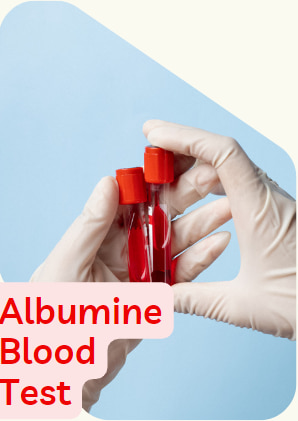Content :
◉ what is albumin blood test?
The albumin blood test is a medical diagnostic test that measures the levels of albumin, known as albuminemia,. Albumin is a protein which is produced by the liver and helps to maintain the balance of fluids in your body.
The albumin test is commonly performed as part of a comprehensive metabolic panel or liver function panel. The test is usually ordered by healthcare providers to evaluate liver and kidney function, as well as to diagnose and monitor various medical conditions.
This is a frequently conducted test, and it only involves a simple blood draw from your arm.

◉ Why it's done?
The albumin blood test holds several important clinical implications:
- Liver Function Assessment: The albumin test is commonly used as a marker of liver function because it is primarily synthesized in the liver.
- Kidney Function Evaluation: The albumin test is used in conjunction with other tests to assess kidney function and detect conditions such as nephrotic syndrome or chronic kidney disease.
- Nutritional Assessment: Albumin is an essential protein involved in maintaining adequate nutrition, so it can assist in evaluating nutritional status and guiding appropriate interventions.
- Monitoring Medical Conditions: The albumin blood test is used to monitor the progress and response to treatment of various medical conditions, including liver and kidney diseases, inflammatory disorders, and certain cancers.
◉ Preparations before albumin test
To prepare for an albumin blood test, you don't need to do anything special. However, your healthcare provider may ask you to fast (not eat or drink) for several hours before the test if you're having other blood tests in addition to the albumin test. You may also need to stop taking certain medications before the test, as some drugs can affect albumin levels in the blood.
It is always best to consult with your healthcare provider for specific instructions before the test.
◉ Normal levels of albumin blood test
The normal range for albumin in the blood is between 3.4 and 5.4 g/dL. However, normal value ranges may vary slightly among different laboratories.
◉ High levels of albumin
High albumin levels, known as hyperalbuminemia, are uncommon, but they can occur in certain medical conditions.
◉ 1. Causes of high albumin levels
- Dehydration: One of the most common causes of high albumin levels is dehydration. When the body is dehydrated, the blood becomes more concentrated, leading to an increase in albumin concentration.
- Steroid Use: The use of corticosteroids, such as prednisone, can cause an elevation in albumin levels.
◉ 2. Symptoms of high albumin levels
Hyperalbuminemia itself does not typically cause specific symptoms. The underlying condition causing high albumin levels may present with its own set of symptoms. For example, dehydration can cause symptoms such as thirst, dry mouth, decreased urine output, dizziness, and fatigue.
◉ Low levels of albumin test
The low levels of albumin in the blood are known as hypoalbuminemia, it can be a sign of certain health issues.
◉ 1. Causes of low albumin levels
- Liver disease: Liver conditions like cirrhosis, hepatitis, or liver failure can hinder the liver's ability to produce albumin, leading to decreased levels.
- Severe malnutrition: Inadequate intake of protein, including albumin, can result in low albumin levels.
- Kidney disease: Damaged kidneys may allow albumin to leak into the urine, reducing its concentration in the bloodstream.
- Inflammatory bowel disease (IBD): Conditions like Crohn's disease can cause chronic inflammation in the intestines, impairing albumin absorption and synthesis.
◉ 2. Symptoms of low albumin levels
Symptoms associated with low albumin levels are not specific to albumin deficiency alone, but may arise due to the underlying condition causing the low levels. These symptoms can include:
- Edema: Swelling in the feet, ankles, or abdomen due to fluid retention.
- Fatigue: Feeling excessively tired or lacking energy.
- Muscle weakness: Weakness or tiredness in the muscles.
- Changes in skin: Dry, brittle hair, yellowish skin and easy bruising.
- Ascites: Accumulation of fluid in the abdomen, leading to bloating and discomfort.
◉ Related analytical tests
Other tests that may be done in conjunction with an albumin blood test include:
- Total protein test: This test measures the total amount of protein in your blood, including albumin and globulins.
- Albumin/globulin ratio (A/G ratio): This test compares the amount of albumin and globulins in your blood. It can help diagnose liver or kidney problems.
- Urine Albumin/creatinine ratio (ACR): also known as urine microalbumin, helps identify kidney disease that can occur as a complication of diabetes.
- Serum electrophoresis: This test separates the different types of globulins in your blood using an electric current. It can help diagnose multiple myeloma.
◉ Conclusion
the albumin test is a crucial diagnostic tool used in the medical field to assess a patient's liver and kidney function, as well as their overall nutritional status.
It helps healthcare professionals evaluate a patient's liver function, as low albumin levels can indicate liver damage or dysfunction. Additionally, this test assists in assessing kidney function, as albumin in the urine can be a sign of kidney disease.